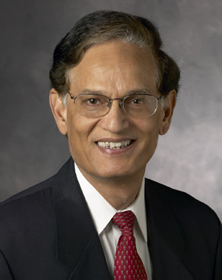Sponsors

KEYNOTE SPEAKER
Professor Krishna SaraswatRickey/Nielsen Professor in the School of Engineering, |

|
BIOGRAPHYProf. Krishna C. Saraswat holds a B.E. degree in Electronics and Telecommunications from Birla Institute of Technology and Science (BITS), Pilani, India in 1968. He obtained his M.S and Ph.D. degrees in Electrical Engineering from Stanford University, Stanford, CA. in 1969 and 1974, respectively. Prof. Saraswat has been a Professor of the Department of Electrical Engineering at Stanford University since 1983. Since January 2004, he has been an honorary Adjunct Professor at BITS, Pilani, India. He serves on the Leadership council of the MARCO/DARPA-funded Focus Center for Materials, Structures, and nano-Devices. His research interests are in new and innovative materials, structures, and process technology of silicon, germanium and III-V devices and interconnects for VLSI and nanoelectronics. Prof. Saraswat has graduated 75 doctoral students and has authored or co-authored over 650 technical papers. He received the Thomas Callinan Award from The Electrochemical Society in 2000 for his contributions to dielectric science and technology, the 2004 IEEE Andrew Grove Award for seminal contributions to silicon process technology, Inventor Recognition Award from MARCO/FCRP in 2007, and the Technovisionary Award from the India Semiconductor Association in 2007. He is listed by ISI as one of 250 Highly Cited Authors in his field. |
|
TOPIC: Industry Academia Collaborative ResearchABSTRACT:Singapore has done a remarkable job in developing the education base. This has made Singapore a formidable country with excellent business climate. For Singapore to remain competitive in the global economy in the future graduate education and research must improve further. Singapore institutions must establish world class research facilities. Infrastructure for research in academia has become prohibitively expensive, especially in the experimental areas. This infrastructure can be provided through multi university collaborative centers with shared facilities. Industry-academia partnership is the fundamental element of such cooperation not only for collaborative advanced research but also for providing practical training to students by industry, and for professional development of industrial employees. Industry generally works on focused execution of technology R&D, and to bring technology to manufacturing floor and thus is in competitive mode for value differentiation for unique technology, unique products and time-to-market. On the other hand academia works on creation of new idea to proof of concept. The industry academia collaboration is best in the non- and pre-competitive mode with knowledge and resource sharing across broad spectrum of organizations, institutions and countries for critical mass. In this talk several examples will be given on this topic from Stanford University, the Silicon Valley and USA. |
|

